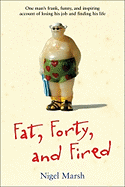
How about fat, fifty, and fired? Or at least a bit overweight, fifty, and fired?
 That is to say that this new book by Nigel Marsh, now chairman of Leo Burnett Australia, an Englishman who has lived in Australia with his family since 2001, resonates with us. But there's no need to be fired to find this book both witty and helpful. It should resonate with most anyone--male or female--trying to balance work and the rest of life. Certainly Fat, Forty, and Fired has already resonated in Australia, where it was a bestseller.
That is to say that this new book by Nigel Marsh, now chairman of Leo Burnett Australia, an Englishman who has lived in Australia with his family since 2001, resonates with us. But there's no need to be fired to find this book both witty and helpful. It should resonate with most anyone--male or female--trying to balance work and the rest of life. Certainly Fat, Forty, and Fired has already resonated in Australia, where it was a bestseller.In early 2003, when Marsh was approaching 40, he was CEO of the Australian subsidiary of a multinational company being merged into another, and the Aussie outfit was shut down. Given the choice of taking whatever job could be found for him in the corporation in any of a number of countries, Marsh realized that he didn't want to uproot his family again--and that his life was painfully out of whack. He was more than 35 lbs. overweight, he drank prodigiously, much of his limited interaction with his four children under the age of nine consisted of shouting at them, he was obsessed by work and he and his wife seemed merely to coexist. So he decided to take a year off and try to reconnect with his family, find more meaning in life than what he achieved in high-powered marketing and advertising--much as he loved that work--and rekindle neglected interests such as drawing and running.
In a heart-to-heart conversation with his wife about his desire to take a break--one that gives a taste of the book's humor and directness--she asks what would happen at the end of the year off. Marsh responds:
"We'd be screwed. All our savings would be gone. I'd be a forgotten, forty-year-old advertising executive who hadn't worked for a year. Unemployable."The answer is that he'll try, and one of his first steps, mentioned almost casually, is giving up alcohol, which makes it much easier to do the many other things he wants to accomplish. And there's a lot to work on! Marsh chronicles his battles and achievements--such as learning to swim freestyle--with wit, humor and poignancy. After all, this ad man has a soul, as befits someone who appreciates art, reads the Bible in Greek and has adopted Quakerism as his religion of choice.
"So I get twice the husband, half the income, and at the end of the year we'll both have to work at Wal-Mart?"
"Basically."
Kate thought for a minute. "If we do this, will you be less of an asshole?"
Most important, during his year off, which actually turned out to be nine months, Marsh learns many beautiful lessons about the people closest to him. After earlier trying to connect with his parents in forced ways, Marsh relaxes enough to go with the flow, and he and his mother cross an emotional divide when they recount a highly embarrassing event from his childhood and wind up giggling "like teenagers." And after many false starts and frustrations with his children, Marsh begins to find that by easing up and going at their pace, "I could get the most enormous joy out of the simplest things. Harry would stand next to me in the mornings and mimic me shaving. The girls would lie on either side of me when I was doing situps and raise their arms and legs while shouting, 'Look at us, Mommy. We're exercising.' Alex and I would sit on the same armchair together and watch The Simpsons most evenings--all the time with him impersonating the characters and making unflattering comparisons between Homer and me."
If there is any flaw to this book, it is that Marsh repeatedly makes the reader laugh out loud and want to read paragraphs at length to any nearby willing listener. We'll stifle an urge to quote yet another story and say simply get a copy of the book.--John Mutter

